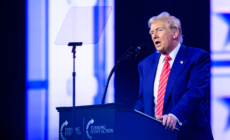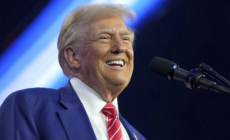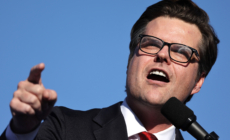-
Imprisoned Bay Area killer convicted of the 1986 murder of two Fremont women - 21 mins ago
-
Surfers Return for Rare Big Wave Contest in Hawaii - 26 mins ago
-
Donald Trump Vows to Rename Tallest Mountain in United States - 31 mins ago
-
Fitness influencer dies 3 months after being shot in robbery attempt - about 1 hour ago
-
Commanders Shockingly Snap Eagles’ 10 Game Winning Streak - about 1 hour ago
-
Trump Previews Second Term in Sprawling Speech to Conservative Conference - about 1 hour ago
-
Tears at Reason Behind Rescue Dog’s Dramatic Reaction To Being Left Outside - 2 hours ago
-
From the Surf to the Sermon: The Christian Surfers of Costa Rica - 2 hours ago
-
Who Is Stephen Miran? What Trump Adviser Pick Has Said About the Economy - 2 hours ago
-
These Spiritual Democrats Urge Their Party to Take a Leap of Faith - 3 hours ago
Prosecutors Want Judge to Act on Key Claim in Trump Documents Case
In an open display of frustration, federal prosecutors on Tuesday night told the judge overseeing former President Donald J. Trump’s classified documents case that a “fundamentally flawed” order she had issued was causing delays and asked her to quickly resolve a critical dispute about one of Mr. Trump’s defenses — leaving them time to appeal if needed.
The unusual and risky move by the prosecutors, contained in a 24-page filing, signaled their mounting impatience with the judge, Aileen M. Cannon, who has allowed the case to become bogged down in a logjam of unresolved issues and curious procedural requests. It was the most directly prosecutors have confronted Judge Cannon’s legal reasoning and unhurried pace, which have called into question whether a trial will take place before the election in November even though both sides say they could be ready for one by summer.
In their filing, prosecutors in the office of the special counsel, Jack Smith, all but begged Judge Cannon to move the case along and make a binding decision about one of Mr. Trump’s most brazen claims: that he cannot be prosecuted for having taken home a trove of national security documents after leaving office because he transformed them into his own personal property under a law known as the Presidential Records Act.
The prosecutors derided that assertion as one “not based on any facts,” adding that it was a “justification that was concocted more than a year after” Mr. Trump left the White House.
“It would be pure fiction,” the prosecutors wrote, “to suggest that highly classified documents created by members of the intelligence community and military and presented to the president of the United States during his term in office were ‘purely private.’”
At a hearing last month in Federal District Court in Fort Pierce, Fla., Judge Cannon herself expressed skepticism about Mr. Trump’s assertion, saying it was most likely not enough to dismiss the case before it went to trial.
But then within days, she made a surprising move, ordering the former president’s lawyers and Mr. Smith’s prosecutors to send her proposed jury instructions suggesting she was open to embracing the very same defense.
Her order sought language from both sides meant to help jurors understand how the Presidential Records Act might affect the accusation that Mr. Trump had taken “unauthorized possession” of the documents he removed from the White House. For Mr. Trump to be found guilty under the Espionage Act, the central statute in his indictment, prosecutors will have to prove that the former president was not authorized to hold on to more than 30 highly sensitive documents after he left office.
Judge Cannon’s order for jury instructions was odd on its face because such issues are usually hashed out on the eve of trial, and she has not set a trial date yet.
It was even stranger because by appearing to adopt Mr. Trump’s position on the Presidential Records Act, the judge seemed to be nudging any eventual jurors toward acquitting Mr. Trump or even leaving open the possibility that she herself could acquit the former president near the end of the proceeding by declaring that the government had failed to prove its case.
Hoping to forestall either situation, Mr. Smith’s prosecutors told Judge Cannon in their filing on Tuesday that the Presidential Records Act had nothing to do with the case and that the entire notion of submitting jury instructions based on it rested on a “fundamentally flawed legal premise.”
Instead, they asked her to decide the validity of the Presidential Records Act defense in a different way: by rejecting Mr. Trump’s motion to dismiss the case based on the same argument. That motion has been sitting on her desk for almost six weeks.
The prosecutors want Judge Cannon to take that course of action, because any decision she makes on the motion to dismiss can be challenged in an appeals court. But if the case is allowed to reach the jury, any ruling she might make acquitting Mr. Trump cannot be appealed.
Almost from the moment she was assigned the case in June, Judge Cannon, who was appointed by Mr. Trump in his waning days in office, has handled the proceeding in an unorthodox manner.
She has put off making several legal and logistical decisions. And she has spent time at hearings entertaining a series of unusual arguments by Mr. Trump’s lawyers that many federal judges would have rejected out of hand.
The legal gamesmanship she has encouraged over how to handle Mr. Trump’s Presidential Records Act defense is all the more bizarre because the argument itself is legally dubious.
The act was put in place after the Watergate scandal not to permit presidents to unilaterally designate government documents — let alone those containing sensitive state secrets — as their own personal property, but precisely for the opposite reason: to ensure that most records from a president’s time in office remain in the possession of the government.
Moreover, Mr. Trump’s lawyers have never said he officially designated the documents in question as his own. Rather, they have claimed that the designation can be inferred from the fact that he took them from the White House to Mar-a-Lago, his private club and residence in Florida, rather than sending them, as the government says he should have, to the National Archives.
The prosecutors told Judge Cannon in their filing that they interviewed numerous high-ranking White House officials during their investigation — including chiefs of staff, senior members of the White House Counsel’s Office, a national security adviser and top members of the National Security Council — and no one recalled Mr. Trump saying he had designated the records that ultimately wound up in the case as personal.
“To the contrary,” the prosecutors wrote, “every witness who was asked this question had never heard such a thing.”
The dispute about the Presidential Records Act is only one of the many questions that Judge Cannon has failed to resolve in the past few months. The delays could have a profound effect on the case: If it is pushed past the election and Mr. Trump wins, he could order his attorney general to simply dismiss the charges.
Judge Cannon has so far not issued a ruling on a request made in January by Mr. Trump’s lawyers for additional discovery material about the prosecution’s ties to the intelligence community and other national security officials. The lawyers want that information to bolster their claims that members of the so-called deep state conspired to bring the case against Mr. Trump in an effort to sink his political campaign.
The judge is also sitting on a nearly 2-month-old request by Mr. Smith to permit redactions to be made to several of Mr. Trump’s own filings to protect the identities of witnesses who might testify for the government at trial. And she is still considering a host of the former president’s pretrial motions to the dismiss the case.
Should they run out of patience altogether, prosecutors could at some point file a motion asking Judge Cannon to remove herself from the case. She would probably reject that effort, requiring the government to go over her head and make the same request to the U.S. Court of Appeals for the 11th Circuit, which sits above her.
Typically, recusal motions require prosecutors to point to flawed decisions. And so far, Judge Cannon has largely avoided making decisions, complicating any effort to get rid of her.


















